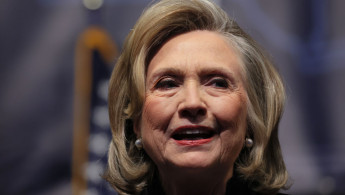Hillary Clinton says 'carrot and stick' needed to persuade Saudi Arabia to take strong stance on Russia
Hillary Clinton said on Sunday that a “carrot and stick” approach was needed to persuade Saudi Arabia to move away from Russian President Vladimir Putin and alleviate the US energy crisis.
The White House has so far failed in its attempts to encourage Riyadh to pump more oil to counteract soaring energy prices following Russia’s invasion of Ukraine.
The former Secretary of State told NBC’s Meet The Press that she would “do whatever I could... to try to be more persuasive [to Saudi Arabia],” adding that punitive policies as well as incentives are required.
Clinton described Saudi Arabia’s rejection of calls for major production hikes as “disappointing”.
Saudi Arabia says it will instead only make modest increases, alongside other OPEC member states.
Clinton has been a longtime critic of Putin and has urged the world to continue to pay attention to Ukraine, believing the war will “drag on” and be “incredibly brutal”.
The former presidential candidate added that “the only positive” of Ukraine’s invasion was that the “world is now awake... some are more awake than others”.
The only way we're going to end the bloodshed and terror Putin has unleashed in Ukraine—and the only way we're going to protect Europe and democracy—is to do everything we can to impose even greater costs on Putin. pic.twitter.com/3TnvTyui6A
— Hillary Clinton (@HillaryClinton) April 4, 2022
The refusal of Saudi Arabia and the UAE to supply additional energy to the US during the now five-week-long invasion has been seen as a sign of souring US-Gulf relations.
Last month, The Times reported that Saudi Crown Prince Mohammed bin Salman and the UAE's de facto ruler, Mohammed bin Zayed, had refused to take calls from US President Joe Biden's office.
However, last Thursday, the Saudi-led OPEC and its allies agreed to a small output hike. The US has released a record amount of barrels from its own reserves in response to the shortage.
The near-finalisation of a revived Iran nuclear deal between Tehran and West states has also put further strain on fractured US-Gulf relations.
“The Saudi-US relationship is in the throes of crisis,” wrote the Saudi editor-in-chief of Al Arabiya, Mohammed Alyahya.
“A more realistic discussion should focus on one word: “Divorce,” he added.





 Follow the Middle East's top stories in English at The New Arab on Google News
Follow the Middle East's top stories in English at The New Arab on Google News


